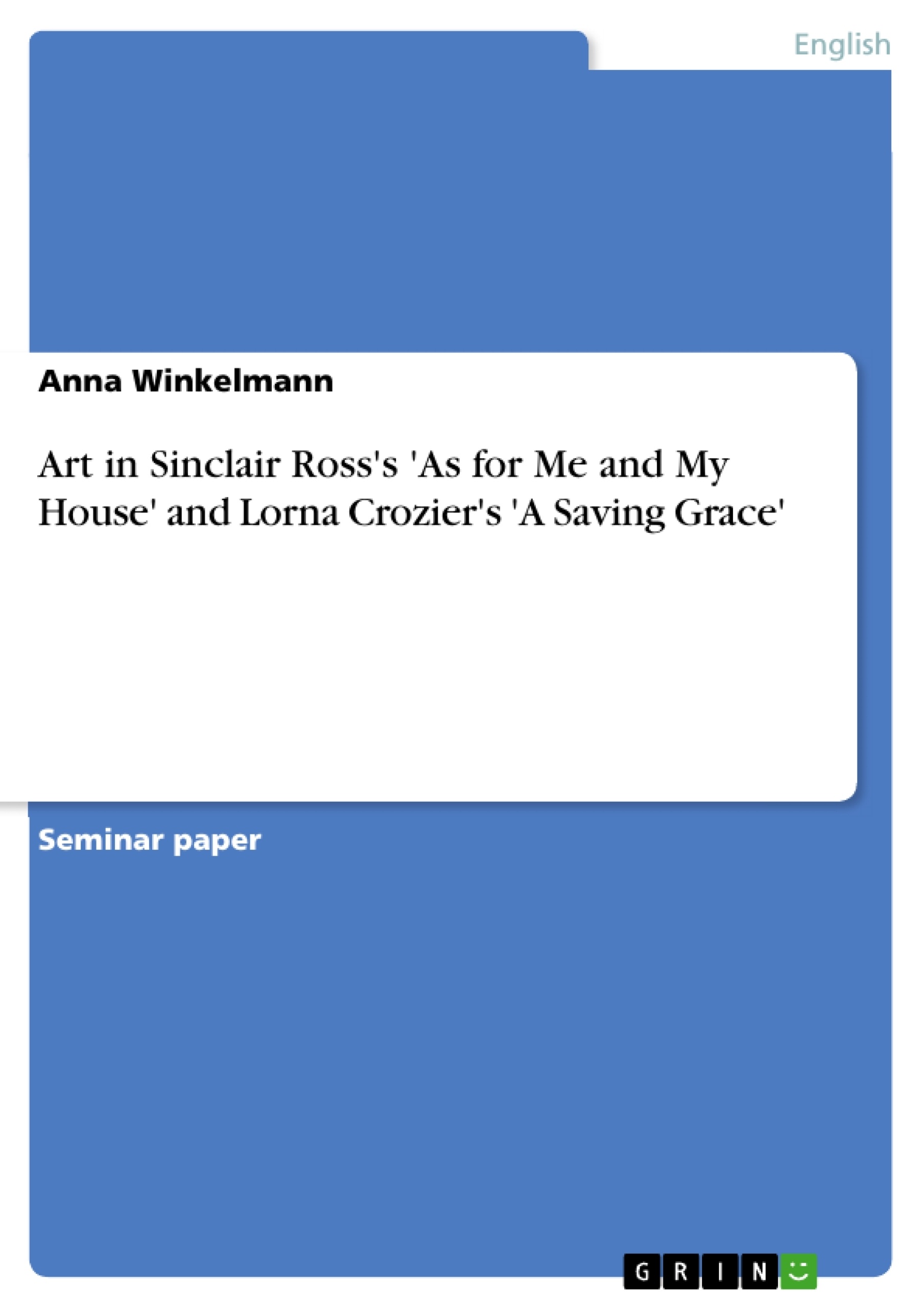Since its reprint in 1957 Sinclair Ross’s As for Me and My House has been considered to be one of Canada’s most important literary works and has been honoured with great attention amongst numerous critics. The discussion ranges from gay / lesbian approaches over biographical comparisons of the characters with historical figures to psychoanalytical approaches to the protagonists’ personalities.
The subjective point of view of the fictional diary of Mrs. Bentley has always been an obstacle for the critics. As the diarist she slips into the roles of author, actor and reader, which leads to a constant shifting of her position as subject, object, observer, or third person.
John H. Ferres has pointed out three capital themes in Sinclair Ross’s works, which are of special relevance for As for Me and My House: the difficulty of communication, the strive for authenticity and the struggle against the harsh Canadian prairie. Being categorized as a “Künstlerroman”, artistic expression of any kind plays a major role in the novel. Thus, art is also functioning as a medium for the expression of the characters’ personalities, for coping with the hostile natural environment and finally for the constant try to carry their inner concerns outside.
Based on As For Me and My House the volume of poems by Lorna Crozier, named A Saving Grace give further insights into Mrs. Bentley’ nature. The poems pick up the topics of Mrs. Bentley’s diary as a kind of fictional continuation in the form of very personal and intimate poems dealing with the same themes of nature, art and communication.
This essay will discuss the relevance of the three mentioned themes and their reappearing in the different art genres treated in the texts, especially writing, painting and music. It will focus on the way in which art is used as a medium of expression and how it distinguishes the characters from each other. Three poems from Crozier’s volume, each dealing with one of the three main genres, will give further insight into these aspects.
Following this the essay will examine the presence of nature in the characters’ lives and artworks, and its significance for their state of minds. Three further poems revolving around the weather and the landscape will illustrate this additionally.
The last point will examine the verbal and non-verbal forms of communication established by the characters. Again the attention lies on the importance of art, here functioning as a medium for communication.
Inhaltsverzeichnis (Table of Contents)
- Introduction
- Art-genres in As for Me and My House and A Saving Grace
- Writing
- Painting
- Music
- Art and Nature in As for Me and My House and A Saving Grace
- Art and communication in As for Me and My House and A Saving Grace
- Conclusion
- Bibliography
Zielsetzung und Themenschwerpunkte (Objectives and Key Themes)
This essay aims to analyze the significance of art in Sinclair Ross's *As for Me and My House* and Lorna Crozier's *A Saving Grace*, focusing on the interplay between the characters' lives and their artistic expressions. It investigates how art serves as a medium of expression, communication, and coping mechanism in the face of a challenging environment.
- The role of art as a means of expression for the characters
- The influence of nature on the characters and their art
- The use of art as a form of communication
- The interplay of different artistic genres, such as writing, painting, and music
- The exploration of themes such as communication, authenticity, and the struggle against the harsh elements of the Canadian prairie
Zusammenfassung der Kapitel (Chapter Summaries)
The introduction establishes the context and significance of *As for Me and My House* and *A Saving Grace*, introducing the main characters and themes explored in the novels. The second chapter examines the different art genres prevalent in both works, specifically writing, painting, and music. It analyzes how these genres contribute to the characters' individual expressions and relationships. The chapter focuses on Mrs. Bentley's secret journal and its impact on her personality and relationship with her husband, Philip. The third chapter delves into the presence of nature in the characters' lives and art, highlighting the significance of the Canadian prairie in shaping their experiences. The fourth chapter explores the various forms of communication employed by the characters, emphasizing the role of art as a means of conveying both verbal and non-verbal messages.
Schlüsselwörter (Keywords)
The central focus of this essay lies on the interplay of art, nature, and communication in Sinclair Ross's *As for Me and My House* and Lorna Crozier's *A Saving Grace*. Key themes include the exploration of artistic expression, the influence of the Canadian prairie environment, and the complexities of interpersonal relationships. These themes are examined through the lens of different artistic genres such as writing, painting, and music.
Frequently Asked Questions
What is the main focus of Sinclair Ross's 'As for Me and My House'?
The novel focuses on the difficulty of communication, the strive for authenticity, and the struggle against the harsh Canadian prairie environment.
How is art used in these literary works?
Art functions as a medium for expressing the characters' personalities, a coping mechanism for the environment, and a form of non-verbal communication.
Who is the author of 'A Saving Grace'?
Lorna Crozier is the author of the volume of poems titled 'A Saving Grace'.
Which art genres are specifically discussed in the essay?
The essay discusses writing (specifically Mrs. Bentley's diary), painting, and music.
What is the significance of the Canadian prairie in these works?
The prairie represents a hostile natural environment that shapes the characters' state of mind and their artistic expressions.
How does Mrs. Bentley's diary complicate the narrative?
As the diarist, she shifts between the roles of author, actor, and reader, creating a subjective and complex point of view.
- Quote paper
- Anna Winkelmann (Author), 2004, Art in Sinclair Ross's 'As for Me and My House' and Lorna Crozier's 'A Saving Grace', Munich, GRIN Verlag, https://www.grin.com/document/65970



